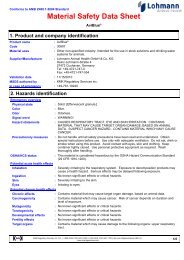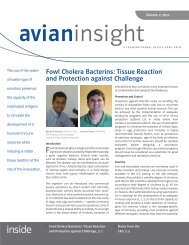Download - Lohmann Animal Health
Download - Lohmann Animal Health
Download - Lohmann Animal Health
You also want an ePaper? Increase the reach of your titles
YUMPU automatically turns print PDFs into web optimized ePapers that Google loves.
NEWS<br />
page 5 issue four<br />
Products<br />
ENCOURAGING SIGNALS ON<br />
CROSS-PROTECTION AGAINST S. JAVA<br />
Clean-up pattern in 8 trial houses from a 100% S. Java-positive farm<br />
Strain-specific vaccines against S. Java are not available in the<br />
market, but some cross-protection from vaccination against<br />
Salmonella Typhimurium is expected, for both serotypes are<br />
categorised under group B of Salmonellae (Kaufmann-White<br />
scheme). In Germany and the Netherlands, AviPro ® SALMONELLA<br />
VAC T, <strong>Lohmann</strong>’s live vaccine for drinking water against<br />
S. Typhimurium, has been used in several field trials to investigate<br />
its aid in the control of S. Java. Farms with good biosecurity,<br />
hygiene control and a monitoring programme for Salmonella spp.<br />
used our ST vaccine for several cycles of broilers.<br />
The results have generally shown that sequential rounds of<br />
vaccination may help cleanup the farm of S. Java.<br />
Salmonella paratyphi B, variation Java (better known as<br />
Salmonella Java) is an increasing problem in chicken farms, a fact<br />
which constitutes a potential threat to public health. The bacteria<br />
may persist on farms despite adequate quality control scores,<br />
appearing again in subsequent chicken flocks (broilers) even after<br />
adequate disinfection procedures. It is believed that the bacteria<br />
may be harboured by unknown reservoirs, which, under sequential<br />
rounds of vaccination, would also be cleaned up, together with the flocks.<br />
These are not only encouraging indicators of cross-protection<br />
of this remarkable vaccine against S. Java, but they also point<br />
out that vaccination only may not be sufficient for a complete<br />
Salmonella control programme. Other preventive measures, such<br />
as clean feeds and water, hygiene, biosecurity and monitoring,<br />
will complete the shield of protection around the birds.<br />
Note: AviPro ® SALMONELLA VAC T does not have a registered claim against S. Java.<br />
Products<br />
FOR CHICKEN ANAEMIA – NO BETTER<br />
PREVENTION THAN THYMOVAC<br />
A serology profile (CAV titres) for breeders and their progeny was<br />
studied by Dr Beatriz Cardoso and Dr Lindolfo Rocha, both based<br />
in the LAH office in Brazil. The study tried to verify a correlation<br />
between breeder titres and progeny titres; difference between<br />
immunisation programmes (drinking water vaccine AviPro ®<br />
THYMOVAC; injected competitor’s vaccine; and naturally infected<br />
breeders); and a correlation between day-of-age titres and<br />
actual CAV field problems. Several flocks from different companies<br />
were studied. Serum was collected at least during 3 different<br />
ages and day-old chicks were tested also from differently aged<br />
flocks. Data was compared to broiler performance.<br />
The results confirmed:<br />
Direct correlation between consistency and uniformity of<br />
breeder titres with progeny titres<br />
For broiler flocks CAV negative at slaughter, no difference in<br />
performance made the titre level at day-of-age<br />
Higher titres at day-of-age<br />
presented better performance<br />
results among broiler flocks<br />
which were CAV positive at<br />
slaughter<br />
Birds vaccinated with AviPro ®<br />
THYMOVAC had the most<br />
consistent, long-lasting titres<br />
in breeders and the higher<br />
averaged titres in the progeny<br />
at day-of-age, compared to<br />
the injected vaccine or to<br />
naturally infected flocks<br />
Protection with AviPro® THYMOVAC<br />
Vaccination stops the spread<br />
of wild virus among breeders<br />
and vertical transmission<br />
The study was presented by Dr Cardoso at the American<br />
Association of Avian Pathologists’ annual conference in<br />
Honolulu in 2006.
















